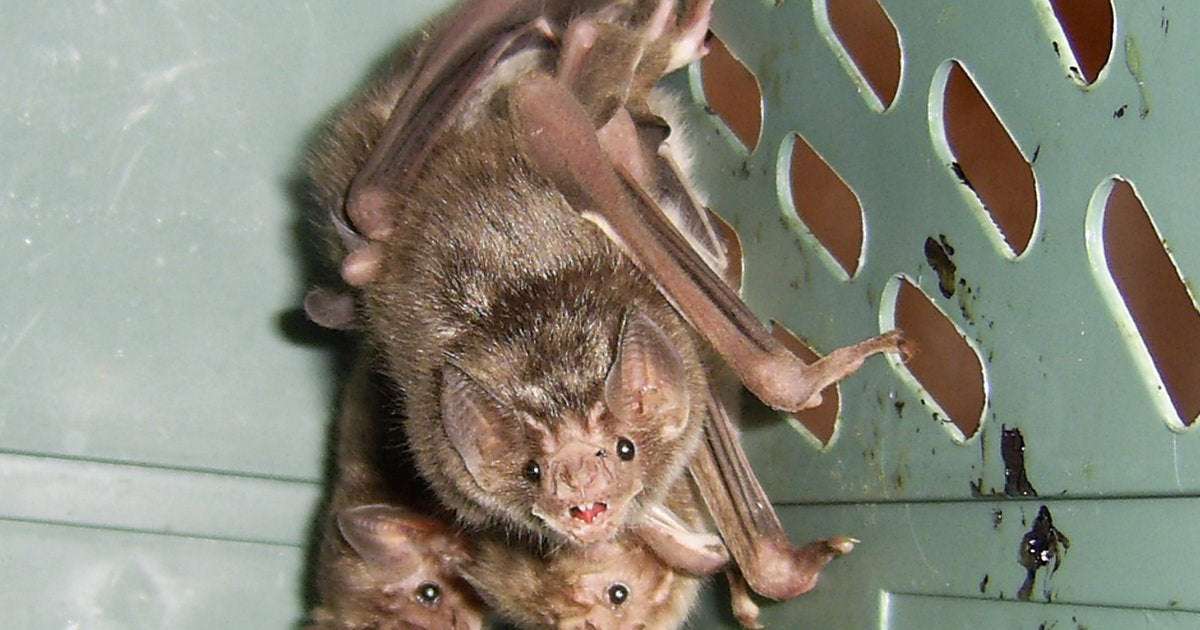A common way illnesses move is through physical interaction – touching hands or hugging, having close conversations, and being coughed or sneezed on are all common ways that pathogens are spread. But the intricacies of how sickness spreads are of increasing importance as diseases like COVID-19 spread around the world, prompting questions about what we really know about transmission.
“Epidemiological models have tried to predict how pathogens spread, assuming all interactions are the same," said Sebastian Stockmaier, a PhD student at the University of Texas. But this isn’t always the case.
New research, led by Stockmaier and published in the Journal of Animal Ecology from a group of researchers in the US and Panama explores how social behaviors in vampire bats were affected when the bats were sick.
Vampire bats are highly social creatures, living in colonies of hundreds to thousands of individuals. Socialization is a key component of their survival strategy, as they care for one another through mutually beneficial behaviors such as reciprocal grooming and food sharing, the process of licking each other’s mouths to share food – the food being regurgitated blood. Relatives are most likely to food-share, and this behavior is more common between female bats than males.
This behavior, while essential to survival, also plays a role in social structure. Studies have shown some bats will stay home while the rest go out hunting, waiting for them to return and food-share regurgitated blood. But, these lazy bats who take advantage of the food sharing process may eventually be treated like freeloaders and be denied food-sharing from bats who spend more time hunting.
To measure how sickness impacts social behavior, both "sickness" and "social behavior" must be defined. Stockmaier and the other researchers defined "sickness" as an immune response to an infection, causing a bat to spend more energy fighting the infection than other activities. They wanted to examine how social behavior, including food-sharing and grooming, were affected when bats were sick.
The researchers monitored the social behavior of a small captive bat colony at the Smithsonian Tropical Research Institute in Panama. Bats were injected with a bacteria that stimulated their immune systems and made them sick, so that they lacked energy for basic activities. Food (raw cattle blood) was dispensed through the trial, and the bats were free to interact with one another. To encourage food sharing, the researchers also periodically withheld food from some of the bats, keeping them isolated from the rest of the group for 26-28 hours. This simulated "missed foraging opportunities," or nights where the bats left their colony to feed but were unsuccessful. The researchers wanted to see if the bats with food would share with the fasting bats when they were returned to the colony.
sick bats groomed bats that were not closely related to them less often than they did when they were healthy
Despite being sick, bats continued to socialize, but sickness changed how they did so. Sick bats groomed themselves less and received less grooming from healthy bats. The researchers attribute this to the symptoms of their illness itself, since the less active bats groomed other bats less, causing healthy bats to not return the favor.
Food-sharing is considered an essential habit for survival, and both sick and healthy bats continued to practice it. Bats that were injected with the bacteria (the "sick" bats) had been fasting before the injection, so they especially needed food. The sick bats then begged for food by licking another bat's mouth. Bats continued to beg and feed each other, despite being sick. The only notable behavioral change that Stockmaier and the other researchers observed was that sick bats groomed bats that were not closely related to them less often than they did when the "groomees" were healthy.
Even in the midst of an epidemic, the vampire bats retained their familial structures – mothers continued to feed their offspring, regardless of who was sick. This shows that while sickness may make bats lethargic and less inclined to socialize, it doesn’t prevent them from doing so with close family members.
Not all diseases are made equal. Many bats in North America are afflicted with white nose syndrome, a fungal disease with a high fatality rate that especially affects hibernating bats. A study on little brown bats found that white nose syndrome also interferes with bat socialization behaviors; sick bats were groomed less and were less likely to visit a water source, likely because the trip took a lot of energy.
Stockmaier compares the group's findings in their vampire bat experiment to a child who is sick at home: Their parent will care for their child no matter what. Says Stockmaier, “If you think of it like social distancing – it’s not like you’re totally self-isolated. You’re probably with your family and still interacting in some way."

Persea_americana on March 27th, 2020 at 17:52 UTC »
ramtax666 on March 27th, 2020 at 17:25 UTC »
They are amazing creatures, strange immune system, cellular metabolism and so on. Their crazy life style is the reason for creating such deathly viruses for us. One must have some tricks to infect a bat, so when jump to us is very effective. We should make efforts to protect this amazing animals from human interaction and by doing this protect ourselves.
Green_Lantern_4vr on March 27th, 2020 at 17:09 UTC »
Bats are very intelligent.
It’s hard to even fathom how they are able to use sound to locate and eat tiny bigs, hundreds of them every night (?).